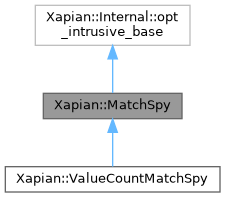Abstract base class for match spies. More...
#include <matchspy.h>
 Inheritance diagram for Xapian::MatchSpy:
Inheritance diagram for Xapian::MatchSpy:Public Member Functions | |
| MatchSpy () | |
| Default constructor, needed by subclass constructors. | |
| virtual | ~MatchSpy () |
| Virtual destructor, because we have virtual methods. | |
| virtual void | operator() (const Xapian::Document &doc, double wt)=0 |
| Register a document with the match spy. | |
| virtual MatchSpy * | clone () const |
| Clone the match spy. | |
| virtual std::string | name () const |
| Return the name of this match spy. | |
| virtual std::string | serialise () const |
| Return this object's parameters serialised as a single string. | |
| virtual MatchSpy * | unserialise (const std::string &serialised, const Registry &context) const |
| Unserialise parameters. | |
| virtual std::string | serialise_results () const |
| Serialise the results of this match spy. | |
| virtual void | merge_results (const std::string &serialised) |
| Unserialise some results, and merge them into this matchspy. | |
| virtual std::string | get_description () const |
| Return a string describing this object. | |
| MatchSpy * | release () |
| Start reference counting this object. | |
| const MatchSpy * | release () const |
| Start reference counting this object. | |
Detailed Description
Abstract base class for match spies.
The subclasses will generally accumulate information seen during the match, to calculate aggregate functions, or other profiles of the matching documents.
Member Function Documentation
◆ clone()
|
virtual |
Clone the match spy.
The clone should inherit the configuration of the parent, but need not inherit the state. ie, the clone does not need to be passed information about the results seen by the parent.
If you don't want to support the remote backend in your match spy, you can use the default implementation which simply throws Xapian::UnimplementedError.
Note that the returned object will be deallocated by Xapian after use with "delete". If you want to handle the deletion in a special way (for example when wrapping the Xapian API for use from another language) then you can define a static operator delete method in your subclass as shown here: https://trac.xapian.org/ticket/554#comment:1
Reimplemented in Xapian::ValueCountMatchSpy.
◆ get_description()
|
virtual |
Return a string describing this object.
This default implementation returns a generic answer, to avoid forcing those deriving their own MatchSpy subclasses from having to implement this (they may not care what get_description() gives for their subclass).
Reimplemented in Xapian::ValueCountMatchSpy.
◆ merge_results()
|
virtual |
Unserialise some results, and merge them into this matchspy.
The order in which results are merged should not be significant, since this order is not specified (and will vary depending on the speed of the search in each sub-database).
If you don't want to support the remote backend in your match spy, you can use the default implementation which simply throws Xapian::UnimplementedError.
- Parameters
-
serialised A string containing the serialised results.
Reimplemented in Xapian::ValueCountMatchSpy.
◆ name()
|
virtual |
Return the name of this match spy.
This name is used by the remote backend. It is passed with the serialised parameters to the remote server so that it knows which class to create.
Return the full namespace-qualified name of your class here - if your class is called MyApp::FooMatchSpy, return "MyApp::FooMatchSpy" from this method.
If you don't want to support the remote backend in your match spy, you can use the default implementation which simply throws Xapian::UnimplementedError.
Reimplemented in Xapian::ValueCountMatchSpy.
◆ operator()()
|
pure virtual |
Register a document with the match spy.
This is called by the matcher once with each document seen by the matcher during the match process. Note that the matcher will often not see all the documents which match the query, due to optimisations which allow low-weighted documents to be skipped, and allow the match process to be terminated early.
- Parameters
-
doc The document seen by the match spy. wt The weight of the document.
Implemented in Xapian::ValueCountMatchSpy.
◆ release() [1/2]
|
inline |
◆ release() [2/2]
|
inline |
◆ serialise()
|
virtual |
Return this object's parameters serialised as a single string.
If you don't want to support the remote backend in your match spy, you can use the default implementation which simply throws Xapian::UnimplementedError.
Reimplemented in Xapian::ValueCountMatchSpy.
◆ serialise_results()
|
virtual |
Serialise the results of this match spy.
If you don't want to support the remote backend in your match spy, you can use the default implementation which simply throws Xapian::UnimplementedError.
Reimplemented in Xapian::ValueCountMatchSpy.
◆ unserialise()
|
virtual |
Unserialise parameters.
This method unserialises parameters serialised by the serialise() method and allocates and returns a new object initialised with them.
If you don't want to support the remote backend in your match spy, you can use the default implementation which simply throws Xapian::UnimplementedError.
Note that the returned object will be deallocated by Xapian after use with "delete". If you want to handle the deletion in a special way (for example when wrapping the Xapian API for use from another language) then you can define a static operator delete method in your subclass as shown here: https://trac.xapian.org/ticket/554#comment:1
- Parameters
-
serialised A string containing the serialised results. context Registry object to use for unserialisation to permit MatchSpy subclasses with sub-MatchSpy objects to be implemented.
Reimplemented in Xapian::ValueCountMatchSpy.
The documentation for this class was generated from the following file:
- xapian/matchspy.h
